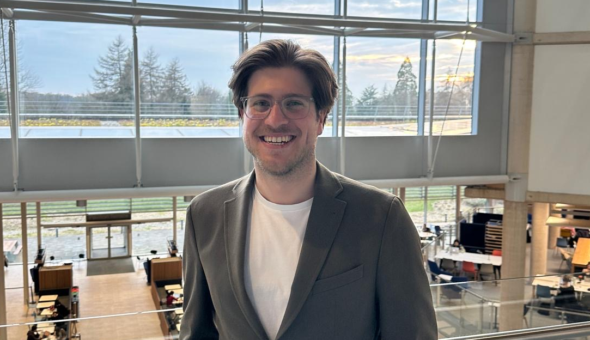As September approaches, our current Masters students look ahead to starting their careers and a new cohort begin their studies in Sustainability and Management. Many of them will be considering whether and how they can make an impact on society and industry. In this piece, current MSc students Sanum Jain and Elliot Johnston use the Two Loops theory to consider where their work and fresh ideas can have the most impact and instigate the most change.
What is the Two Loops theory?
The Two Loops theory, developed by the Berkana Institute, is all about change within our social and economic systems. According to the theory, socio-economic activity can be split into two ‘loops’. The first loop is the ‘incumbent loop’ - which represents the status quo, the way things have ‘successfully’ operated for decades. The second is the ‘disruptive loop’ which represents progressive change and alternative ways of doing business or operating in society.
The theory states that as the incumbent loop reaches its peak in output, ‘disruptors’ start considering more efficient and socially progressive ways of operating. Breakaway individuals look to invest in these ideas, taking intellectual and financial capital out of the first loop and starting to build up the second ‘disruptive loop’. The best way to visualise this is as two waves. As the incumbent wave crests and reaches peak economic output, the disruptive wave starts to build in its shadow.

Change in the energy industry
The concept of waves of progressive change is particularly relevant to sustainable development. Let’s use the energy sector, specifically fossil fuels and inefficient energy grid systems, as our representation for the first loop. We would argue that we currently sit on the downward curve of the first wave. While non-renewable fossil fuels are still our main source of energy, the threat they pose to our planet is increasingly recognised. At the peak of the coal, oil, and gas industries, pioneers began to experiment with alternatives - nuclear, wind, solar - beginning the disruptive second loop.
The viability of these new technologies has increased and before long the renewable energy industry - or the disruptive loop - will usurp the fossil fuel industry in terms of output. This threat to incumbent firms is already being felt. Large oil companies are making huge investments in renewables in a bid to survive society’s shift away from fossil fuels, as exemplified by Total’s acquisition of SunPower. Such acquisitions are an example of corporate movements beyond traditional CSR, which tends to focus on mitigation of the negative impacts ‘business as usual’. These forays into the disruptive renewable energy industry are representative of what incumbent firms need to do to stay relevant.
What does this mean for sustainability
The Two Loops theory does not only work on an economic, practical level. We believe it should be seen as a representation of a prevailing narrative within business and society.
Seen through the lens of the Two Loops theory, incumbent firms own the concept of sustainability, but they approach it from an institutionalised position. Most firms engage in philanthropic activities for the sake of reputation gains and slowly adhere to the pressures of stakeholders to implement responsible business measures.
We could identify the second loop, which intends to represent an alternative, disruptive vision of how the world could be, as a developing system of innovative, mission-driven organisations and social entrepreneurs whose goal is to solve problems, bring change and benefit society.
Unlike the energy sector, the social endeavours of businesses are at an earlier stage of development, but change is coming. We have seen organisations emerge who represent a shift in the status quo.
Divine Chocolate, for example, is proving that employee owned cooperatives can shift a company’s focus towards a more positive impact for its stakeholders. We have also seen the introduction of Community Interest Companies (CICs), businesses with primarily social objectives whose surpluses are reinvested in the business or in the community, rather than distributed to shareholders. CICs help to protect the mission of smaller disruptive organisations and prevent any dilution of the integrity of the second loop.
Creating change in the workplace
What might this theory mean for us, as young people preparing to enter the workplace? Understanding and appreciating the potential for industries to work differently is something that will be key in instigating further change. Thinking about what these changes might look like could provide us with a different path as we start to navigate our professional journeys.
In the context of the Two Loops theory, we may have only considered the option of working for firms that make up incumbent loops. It is very easy to assume these firms will continue to operate in the way they always have, and during the early steps of our careers, maintaining the first loop may seem like the sensible option.
But, as the next wave of business professionals, we believe that it is imperative to look ahead at the future of careers, our industries, and society. We will have the opportunity to contribute to strategy, operational, and CSR efforts within the companies we work for. We will have the chance to act as change agents within these firms. This might lead us or those around us to head out and act as pioneers in new firms that start the next disruptive loop, or we may stick around to help the incumbent loop move closer towards the disruptive loop before it fades into insignificance,
We don’t know if the journey towards a truly sustainable world lies in this next disruptive loop, or the one after that. What we believe though, is that if progress is going to be made we should be using our education and newfound skills to take a risk and invest our careers into nurturing an alternative, progressive, disruptive system.
Image by Daniel Parks
Respond



